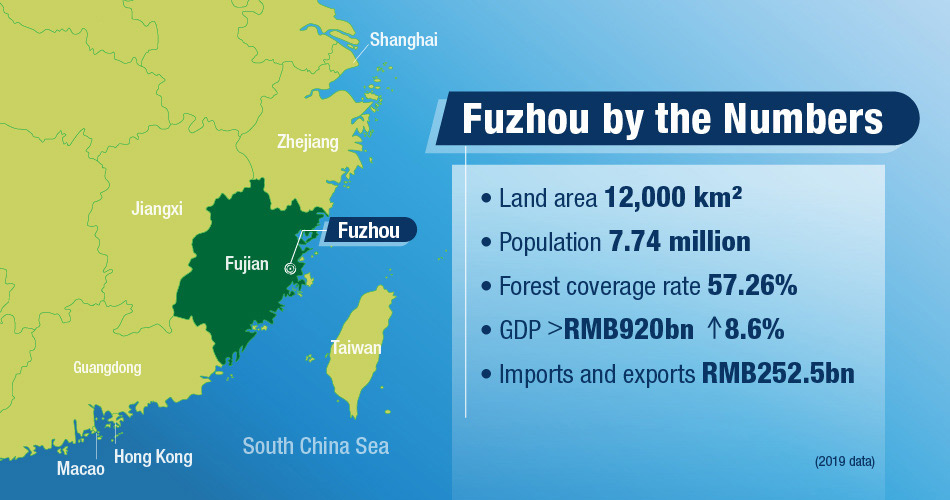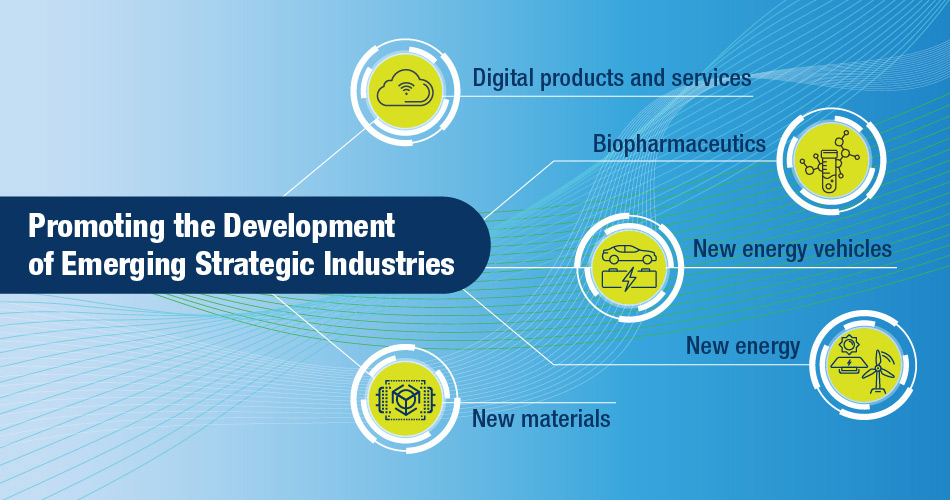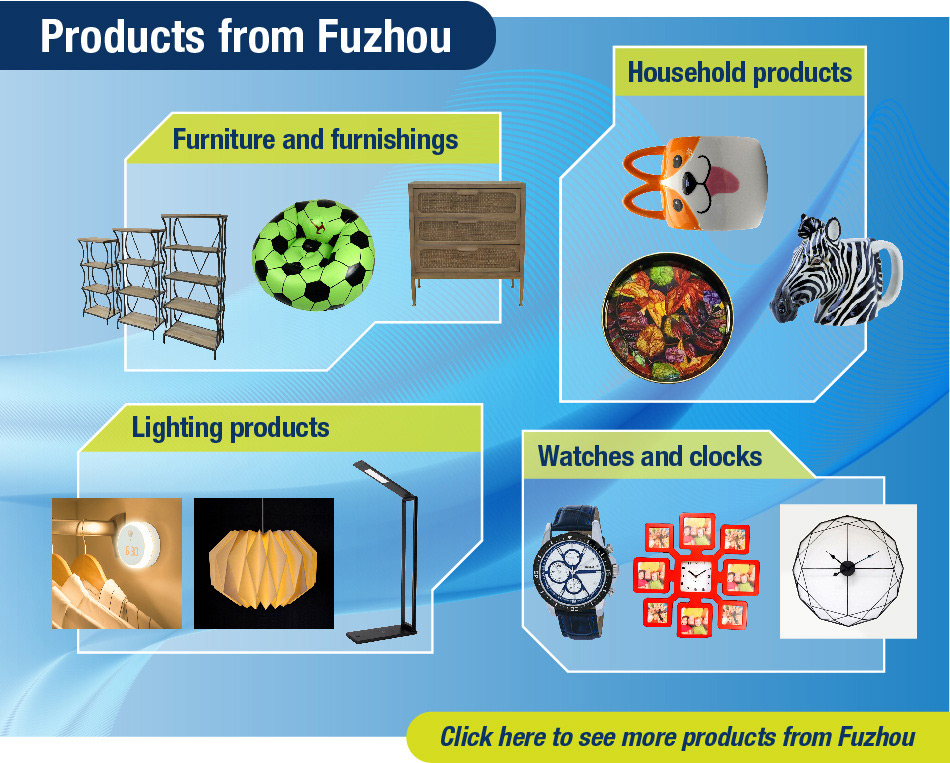Traditional industries of Fujian’s provincial capital are being upgraded with new- and high-technology to become bigger, stronger and better
Fuzhou is the capital of Fujian Province in Mainland China, possessing a total land area of 12,000 square kilometres and a total population of 7.74 million. It is the political, economic and cultural centre of the province.
Fuzhou enjoys a unique location that is conducive to open foreign trade. Along with Taiwan to its east and Hong Kong and Macao to its south, the city also has long established close ties with Southeast Asia countries.
Since the country’s reform and opening up, Fuzhou has led the way to prosperity with rapid economic development, social harmony and stability. Its residents now enjoy a peaceful and satisfying work-life balance. In recent years, the central government has granted Fuzhou several preferential policies to help it incorporate “six zones” in one city, including a national-level new zone, 21st Century Maritime Silk Road core zone, free trade pilot zone, national ecological civilisation pilot zone, national independent innovation demonstration zone and national marine economic development demonstration zone. It is no wonder Fuzhou has become a shining pearl on the southeastern coast of Mainland China.

Pleasant environment, convenient transportation
Fuzhou is surrounded by and suffused with a pleasant natural environment including mountains, seas, rivers, lakes and hot springs, guaranteeing fresh air and wonderful living conditions. The city’s air quality ranks third among all the provincial capitals of Mainland China, while its forest coverage rate is 57.26 per cent, ranking second among the provincial capitals.Fuzhou has a convenient transportation network comprised of a three-in-one system of sea, land and air transportation. Fuzhou Changle International Airport operates 128 domestic and overseas routes, reaching 98 cities around the world. Fuzhou Port has routes to more than 40 countries and regions. Moreover, intercity transportation has been enhanced by several high-speed rails, while two of the nine subway lines under construction are now in service, with the rest to be opened one-by-one annually.

Complete industrial system
Fuzhou fosters a complete industrial system. While specialised agriculture is booming, a modern industrial system and a new retail model is taking shape. The city’s maritime economy is also on the upswing, with a growing digital sector and high-tech industries providing the momentum.In 2019, the city’s GDP grew 8.6 per cent to more than RMB920bn, ranking 27th in the “2018 Top 100 Cities in Mainland China”. It has established trade relations with 220 countries and regions and its total imports and exports in 2019 amounted to RMB252.5bn. The city has more than 300 scientific research institutes, including 38 colleges and universities such as Fuzhou University and the Haixi Branch of the Chinese Academy of Sciences. In all, the city nurtures more than 300,000 students in all levels of education institutions.
Traditional industries in Fuzhou are being upgraded to become bigger, stronger and better. The city is integrating resources to achieve its three development goals of “Digital Fuzhou”, “Marine Fuzhou” and “Platform Fuzhou” with the aim of achieving a high level of development in the digital, marine and platform-based economy sectors. The city has already formed five RMB100bn industrial clusters including textiles and chemical fibres, light industrial and food production, machinery manufacturing, metallurgical building materials and electronic information. It also focuses on promoting the development of strategic emerging industries such as the digital industry, biopharmaceuticals, new energy vehicles, new energy and new materials.

RMB100bn industrial clusters
1. Electronic informationElectronic information is a pillar industry of Fuzhou that has complete industrial facilities and exerts wide influence. The industry focuses on the development of display panel production, integrated module and circuit design and adaptation of domestic chips.
2. Textile and chemical fibre
Textile and chemical fibre manufacturing, Fuzhou’s traditionally superior industry, is supported by Changle District’s China Textile Industry Base. It focuses on the development of a textile and chemical fibre industry cluster covering chemical fibres, cotton spinning, weaving, dyeing and finishing, garments and textile machinery.
3. Light industrial and food production
Light industrial and food production is an important traditional industry of Fuzhou. It mainly covers four categories: food processing and manufacturing, plastic boxes and luggage, cultural and educational sports goods, and arts and crafts products. The industry is promoting intelligent, standardised and personalised production and vows to establish a traceability system to enhance food safety.
4. Machinery manufacturing
Machinery manufacturing is another of Fuzhou’s pillar industries. Its focus is on the development of aircraft and parts manufacturing and cultivating new energy automotive industry clusters to enhance the construction and production capacity of specialised ships, marine products and large ships with high-end technology and high added value.
5. Metallurgical building materials
The metallurgical building materials industry is an important traditional industry in Fuzhou. The core areas of development are downstream industrial chains including plate and strip materials, stainless steel, aluminium alloy and aluminium deep processing.

Strategic emerging industries
1. Digital industryFuzhou has successfully hosted two Digital China summits and has sped up construction of digital projects such as Southeast China’s Big Data Industry Park and Mawei IoT Industry Base. The development of cloud computing, big data, IoT, AI and blockchain industries is also a priority.
2. Biopharmaceutics
Biopharmaceutics flourishes in Fuzhou. Industries that have emerged in Fuzhou include biopharmaceuticals, genetically engineered drugs and genetic diagnostic reagents, chemical raw materials, modern Chinese medicine, medical devices and biomedical analytical instruments. In addition, efforts are currently underway to introduce high-end medical equipment projects and to enhance development of cell engineering, marine biopharmaceuticals, genetic testing, molecular diagnostics and health and medical big data applications.
3. New energy vehicles
Fuzhou’s automobile industry is heading towards transformation and upgrading. New energy vehicle production is being spearheaded by industry heavyweight Southeast Automobile, while concerted efforts from Guancheng Ruimin New Energy Technology, Xucheng Technology and Wanrun New Energy Automobile have formed a complete industrial chain. The city is also focused on the development of supplementary industries such as drive motors, hydrogen fuel batteries, power lithium batteries, motors, electronic controls, charging piles and automotive electronics.

4. New energy
The new energy industry is an important driving force for Fuzhou to transform its economic development mode, optimise its industrial structure and build a high-end industrial centre. Special efforts will be given to the development of wind, biomass and solar energy applications to attract new energy leaders and technology companies to set up base in the city.
5. New materials
Great potential is seen in Fuzhou’s new chemical material industry, with Zhongjing Petrochemical, Southeast Electrochemical, Tianchen Yaolong New Materials and Kuncai Fine Chemicals as leaders, and Fuqing Jiangyin and Lianjiang Kemen Chemical New Material Industrial Park as the main vehicles to establish a reputable chemical industry. The city is also making a great effort to introduce new materials such as ethylene, polyethylene, aniline, synthetic ammonia, hydrogen production, cyclohexanone and polyurethane.

